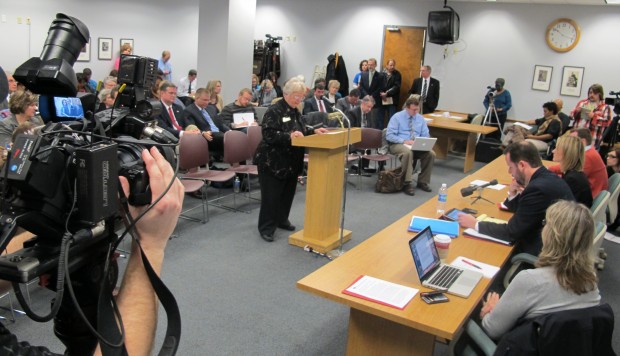Opponents Of Sped-Up School Takeover Timeline Let State Officials Have It

Kyle Stokes / StateImpact Indiana
Shirley Wright, executive director for the Indiana Middle Level Education Association, testifies before a State Board of Education hearing in Indianapolis on Tuesday. Roughly 70 people attended the public hearing. One state board member was present.
Opponents of a rule that could put 105 schools in jeopardy for state intervention or takeover next year voiced their displeasure Tuesday at a public meeting in Indianapolis before the state executive panel behind the proposed change.
One member of the Indiana Board of Education was present at the hearing for a proposed rule to speed up Indiana’s timeline for state intervention in the worst-performing schools.
Roughly 70 other people attended the hearing, including parents, representatives for statewide interest groups, and Indiana Department of Education staff.
If passed, the proposed rules would enable the state to take over or intervene in any school that had received an F for four consecutive years. It currently takes six consecutive F’s to initiate the intervention process. The rules would also allow any combination of D’s and F’s for five straight years to start the takeover process.
Criticisms — and critics — varied widely. Among them:
- Derek Redelman, representing the Indiana Chamber of Commerce. Redelman says the proposed rules focus too much on whether students actually pass tests. He says he’d prefer a system that better measures a student’s growth in scores. “Passing scores dominate the model, rather than growth, which is the whole intent of this discussion,” Redelman said.
- Chuck Little, representing the Indiana Urban Schools Association. Little criticized the State Board for having only one member present, and made a point of his refusal to term the meeting a bona fide public hearing. “Local control of public schools is being taken away in a very systematic and organized way,” Little said.
- Consetta Raimondi, representing the Lawrence Township schools. “Am I anti-reform? Absolutely not. I have applauded the majority of reform efforts implemented on the state and national levels,” says Raimondi. A middle school district in Lawrence Township schools could face intervention the state adopts the rule change. She continued, “That being said I am also discerning enough to know when good intentions around accountability are ill-conceived and have potentially-devastating costs for communities.”
- John Ellis, representing the Indiana Association of Public School Superintendents. Ellis argued the new system needs “test runs” to ensure the changes it would cause to the state’s grading system would be fair to all schools.
- Todd Whitlock, representing North Daviess schools. Whitlock argued for making the rules non-retroactive, meaning they would not take effect after this year’s round of state testing. “We are halfway through the year, yet we don’t know what rules we’re playing by this year,” Whitlock said.
The four-person panel presiding over the hearing — which included State Board member Jo Blacketor and the Indiana Department of Education’s chief accountability officer Jon Gubera — did not answer criticisms, but accepted documentation from those who offered testimony.
Indiana Department of Education officials defend the proposed rule as relying on multiple measures — not just test scores, but rates of participation on state exams, improvement in performance, and even high school graduation rates in some measures. The rules also eliminate an unpopular ‘AYP cap’ from the current letter grading system.
“We don’t really as adults have the time to say ‘let’s compromise their educational experiences.’ So we’re going to push for improved accountability standards in the General Assembly, and we hope to provide proactive interventions sometime in the future,” state superintendent Tony Bennett has said. He did not attend the hearing.
The proposed rule also ties into the state education officials’ goal of having all schools earning A letter grade ratings from the state by 2020.

